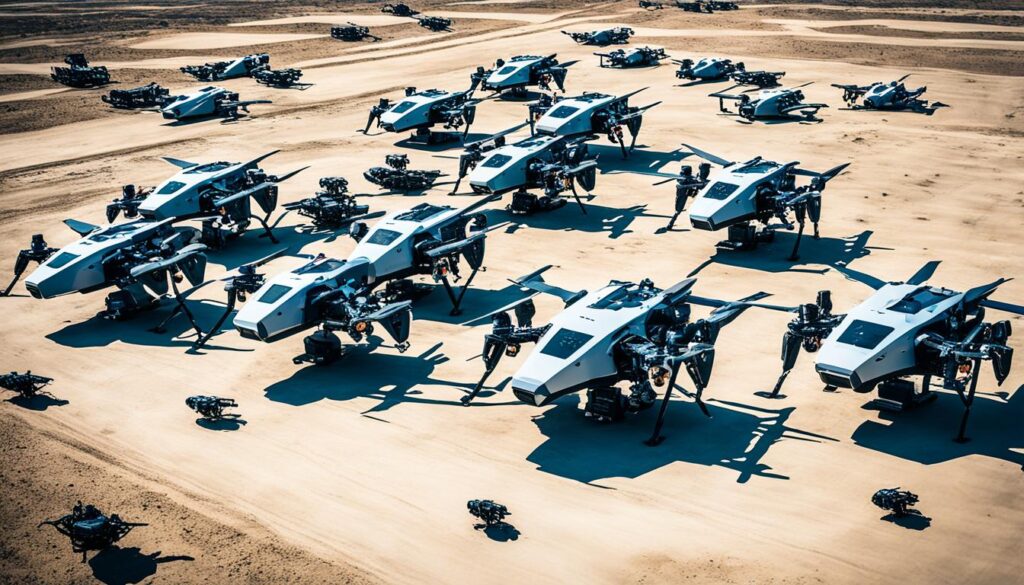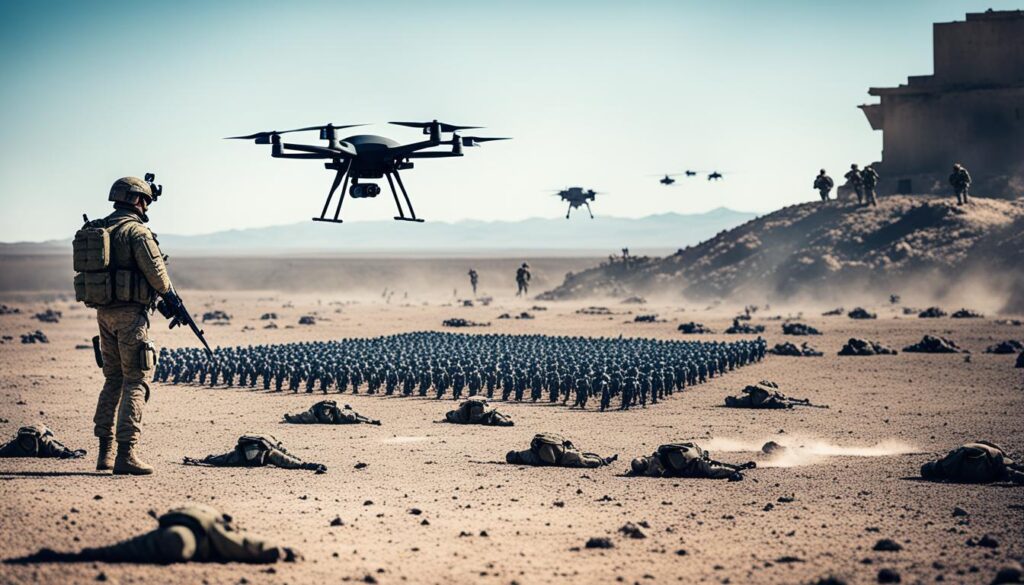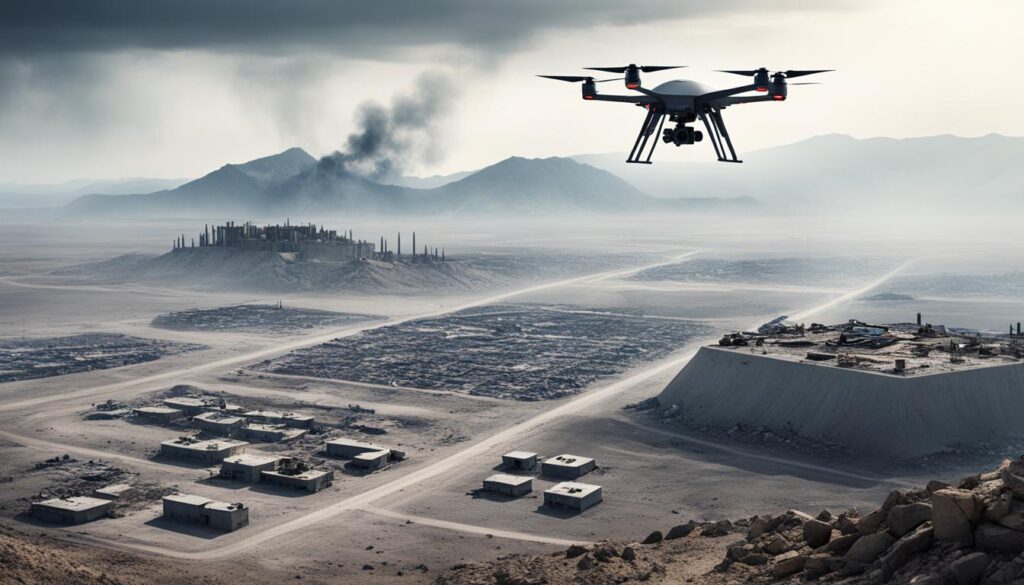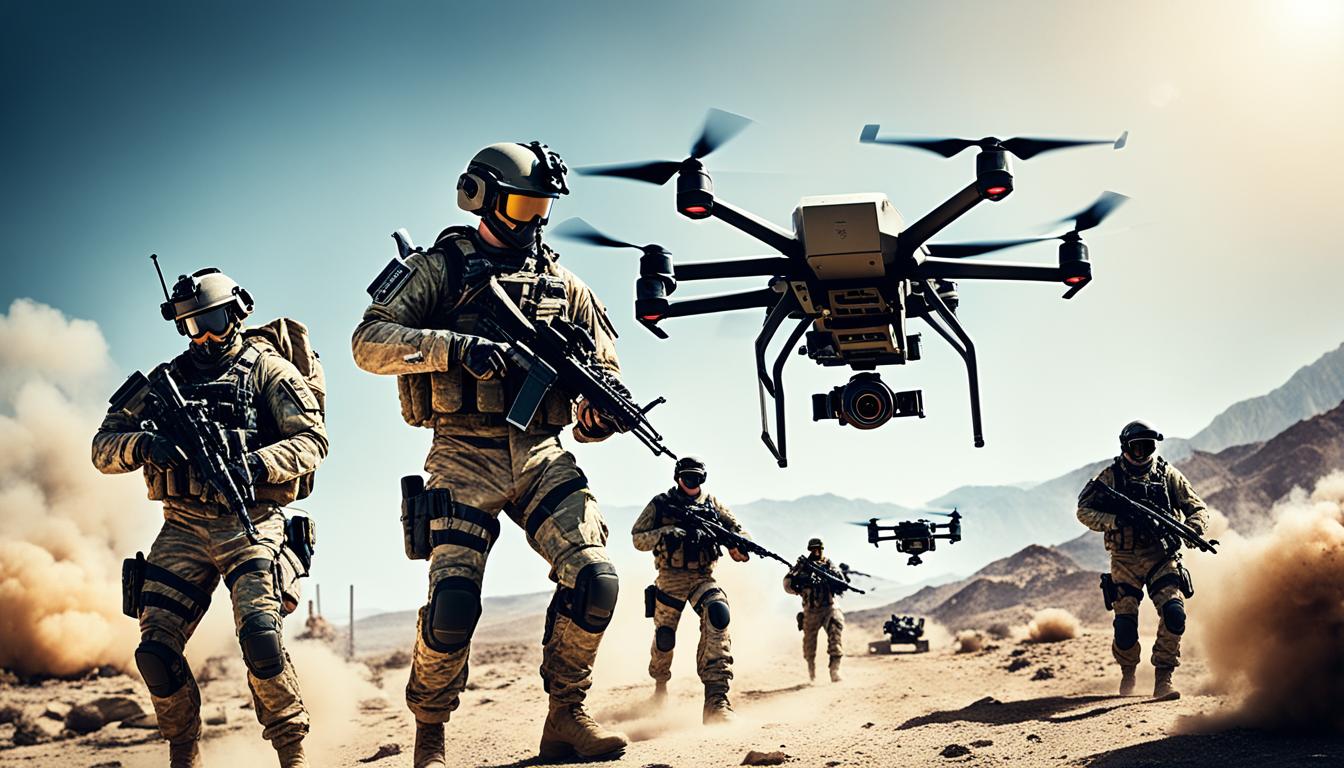Did you know that the United States and China have each invested a staggering $150 billion in the pursuit of AI technology leadership? This massive financial commitment underscores the transformative power of artificial intelligence (AI) in modern warfare. As military strategist John Arquilla notes, the integration of AI into defense systems is not merely an enhancement; it fundamentally alters the nature of warfare itself. From natural language processing systems like GPT-3, which enhance communication to the development of autonomous weapons, AI technology in military applications is reshaping efficiency, accuracy, and safety on the battlefield.
However, this rise in AI’s prominence comes with significant ethical and legal challenges. Concerns surrounding the unintended consequences of AI systems, such as potential human rights abuses and cyber attacks, loom large over its rapid implementation. The central question is whether the increasing reliance on AI in military operations is worth the risks that may accompany it. This critical review will explore the role of artificial intelligence in modern warfare, examining both the exciting possibilities and the profound ethical dilemmas that accompany this rapidly evolving landscape.
Key Takeaways
- AI is significantly enhancing military operations through improved communication and efficiency.
- The United States and China are both heavily investing in AI to dominate military technology.
- Ethical challenges surrounding AI, including human rights impacts, must be addressed.
- AI’s rapid integration raises concerns about its potential misuse in defense strategies.
- Understanding AI’s decision-making limitations is essential for military applications.
The Evolution of AI in Military Applications
The evolution of AI is significantly transforming the landscape of military operations. In the mid-20th century, theoretical concepts began to emerge, paving the way for practical applications in various military branches, including the Army, Navy, Air Force, Space Force, and Cyber Command. The adoption of military applications of AI marks a pivotal shift from traditional warfare methods to advanced, technology-driven strategies.

A notable area of focus is the development of autonomous systems. The Army employs autonomous ground vehicles for reconnaissance and logistics, enhancing operational efficiency. The Navy integrates AI in autonomous ships and anti-submarine warfare, which is crucial for maintaining maritime superiority. Air Force initiatives revolve around autonomous drones that assist pilots and improve air traffic control, revolutionizing air combat approaches.
Emerging threats in the space domain prompted the Space Force to leverage AI for satellite management and situational awareness. Meanwhile, Cyber Command utilizes AI to enhance network defense and conduct offensive operations, reflecting the growing importance of cyber warfare. This multifaceted utilization of AI exemplifies the defense sector AI evolution aimed at enhancing decision-making, speeding reaction times, and ensuring continuous operational capability.
Yet, while the military applications of AI promise numerous benefits, they also introduce ethical dilemmas and operational challenges. Concerns of reliability, data dependence, and the potential for escalation raise questions on the integration of AI within military frameworks. As the evolving landscape of AI continues to shape warfare, attention to both the advantages and the disadvantages remains vital for achieving overall military readiness.
Understanding AI Technology in Military
The integration of AI technology in military operations is transforming how commands are executed, enhancing both operational effectiveness and strategic advantages. Understanding military AI systems provides insights into the capabilities and challenges faced on modern battlefields. While various AI technologies contribute to this evolution, the emphasis often lies with machine learning, natural language processing, and autonomous systems. These key AI capabilities in warfare serve distinct functions, which are crucial for the military’s adaptability and responsiveness.
Key AI Technologies
Machine learning is a cornerstone of modern military operations. It allows systems to rearrange data inputs to detect threats and analyze complex scenarios swiftly. Algorithms support various applications, from predictive analytics to real-time decision-making, significantly reducing the number of warfighters who could otherwise be exposed to danger. Furthermore, unsupervised learning is vital for operational success, as it makes sense of unstructured data encountered in unpredictable environments.
Natural language processing plays a pivotal role in streamlining communication within military contexts. This technology enhances logistical operations by automatically interpreting commands, ensuring swift responses in critical situations. By elevating the efficiency of message parsing, it supports better coordination among units facing time-sensitive missions.

Autonomous systems embody the future of warfare strategy. These systems operate with a degree of independence, facilitating action in scenarios hazardous to human soldiers. The development and deployment of these technologies prompt essential discussions surrounding control and ethical responsibility during combat operations. With algorithmic warfare, decisions are made at unprecedented speeds, allowing forces to adapt rapidly to evolving threats.
As AI technology in military continues to progress, the emphasis on adaptability and operational readiness becomes paramount. The military seeks systems that are not only efficient in existing frameworks but also capable of learning and evolving alongside new data. This ongoing evolution ensures that military AI systems can maintain a tactical advantage while navigating the complexities of modern warfare.
Critical Review: The Role of Artificial Intelligence in Modern Warfare
Artificial intelligence continues to transform military practices, significantly affecting tactics and operational strategies. This critical review AI roles emphasizes the value of AI in warfare through various applications, particularly in enhancing decision-making and battlefield awareness. AI’s integration significantly aids strategic planning, with sensor networks providing real-time information that sharpens operational efficacy.
The impact of AI on military strategies is palpable, especially in the realm of digital warfare. Research indicates AI systems can predict adversary behavior, offering a decisive edge in conflict scenarios. As the technology evolves, military leaders find themselves navigating the paradox of leveraging these advancements while managing ethical considerations. Caution in designing autonomous systems is essential, as it can prevent antisocial or harmful outcomes that may arise.
Among the pressing challenges related to AI and warfare are issues of transparency and accountability. The responsibility for autonomous systems extends to the human designers, deployers, and overseers. Ethical concerns arise particularly in humanitarian contexts, where decisions made by AI systems could lead to severe consequences.
The potential concentration of power and wealth connected to AI raises alarms, necessitating ethical reflections that surpass mere technical solutions. To mitigate these risks, the Defense Innovation Board conducted an extensive study to formulate AI ethics principles for the US Department of Defense. The research produced five principles—Responsible, Equitable, Traceable, Reliable, and Governable—that aim to establish a robust ethical framework for AI deployment in warfare.
| AI Ethics Principles | Description |
|---|---|
| Responsible | Ensuring AI systems are designed and deployed in ways that adhere to ethical standards. |
| Equitable | Guaranteeing that AI deployments do not propagate bias or inequality. |
| Traceable | Enabling accountability and transparency in AI decision-making processes. |
| Reliable | Maintaining high performance and safety standards for AI systems in military applications. |
| Governable | Frameworks to ensure proper oversight and control of AI technologies. |
With the rapid pace of technological advancement, AI is poised to become a game-changer in modern warfare. A clear vision for increased automation and efficiency has emerged, driven by innovations in drone bot systems and the Internet of Things (IoT). Combining modeling and simulation (M&S) with AI and big data offers promising strategies for overcoming limitations, reflecting a vital leap forward in military capabilities.

Key AI Technologies Transforming Warfare
In recent years, significant military advancements in AI have emerged, reshaping the landscape of modern combat. Key AI technologies, particularly in autonomous systems, data analytics, and robotics, have demonstrated their capacity to enhance battlefield effectiveness and strategic planning.
Recent conflicts in regions like Ukraine, Azerbaijan, Syria, and Ethiopia illustrate how autonomous and semi-autonomous drones serve as affordable and efficient means of targeting conventional forces. The deployment of lethal autonomous weapons systems (LAWS) highlights a rapidly changing global order, particularly with the rise of powers like China. This development raises urgent discussions focusing on the necessity of governance and treaties surrounding the use of such technologies.

Many nations are advancing their capabilities with LAWS, despite international calls for bans on autonomous weaponry. This situation is compounded by a lack of mutual trust among major military powers, which complicates the pursuit of arms control agreements. Insights drawn from historical negotiations surrounding weapons of mass destruction underline the potential for defining new rules about AI weaponization.
AI transforms military strategies, where operations evolve from traditional engagements to data-driven decisions. As countries like the United States, China, and Russia invest billions into AI R&D, they seek to implement advanced AI-powered systems that enhance efficiency and effectiveness on the battlefield. AI applications have grown from basic automation to sophisticated decision-making capabilities, influencing everything from smart missiles to logistics management.
The implications of AI technologies are profound, indicating a shift towards faster, information-dependent warfare. This evolution brings not only operational advantages but also potential ethical challenges, such as accountability and unintended outcomes in combat situations. AI is fundamentally altering how battles are fought, showcasing its role in modern warfare that emphasizes both conventional and technological superiority.
| AI Technology | Application | Impact on Warfare |
|---|---|---|
| Autonomous Drones | Attacking conventional targets | Increased efficiency and cost-effectiveness |
| Lethal Autonomous Weapons Systems | Target identification and engagement | Shifts strategies and ethical considerations |
| AI in Cyber Warfare | Defending against cyber-attacks | Enhanced protection of military networks |
| Predictive Maintenance Models | Equipment upkeep and readiness | Reduces downtime and operational costs |
| Data Analytics | Strategic decision-making | Improves situational awareness and planning |
Impacts of AI on Defense Sector Efficiency
The integration of AI technologies in the defense sector signifies a transformative shift towards enhanced operational efficiency in military operations. The substantial growth of the Artificial Intelligence market, projected to reach nearly $60 billion, reflects the increasing recognition of AI benefits military practices. This investment highlights a broader commitment to harnessing AI’s potential, which experts believe will boost productivity by an impressive 40%.
AI plays a pivotal role in various military applications, particularly in logistics optimization and advanced reconnaissance. For instance, the use of automated systems facilitates faster decision-making processes, minimizing human error and improving response times. Implementing AI in command and control systems provides real-time data analysis, optimizing communication and coordination among forces—critical aspects of successfully executing military missions.

Moreover, the accuracy of target recognition systems has seen notable improvements, driven by AI’s analytical capabilities. In the realm of cybersecurity, AI-enabled systems proactively track and counteract potential cyber threats, safeguarding sensitive military information. Similarly, utilizing AI in autonomous vehicles allows for efficient transportation of soldiers in combat scenarios, enhancing overall operational readiness.
AI also contributes to the enhancement of healthcare support within military contexts. Its integration with Robotic Ground Platforms provides vital medical assistance to soldiers stationed in conflict zones. The Pentagon’s growing funding towards simulation and training applications emphasizes the military’s aim of moving beyond traditional educational methods, thus increasing the effectiveness of personnel training.
Empirical data from military operational deployments indicates that the efficiency gains derived from AI significantly bolster the impact of AI on defense sector performance. This shift not only promotes superior effectiveness in battle scenarios but also ultimately enhances national security through more informed decision-making. As the U.S. military continues to invest heavily in AI-driven technologies, the potential for unprecedented advancements in military operations remains promising.
Ethical and Legal Challenges of AI in Warfare
The integration of AI in military applications presents profound ethical challenges of AI that warrant in-depth scrutiny. The deployment of autonomous systems raises critical questions concerning accountability, especially as these technologies begin making decisions previously reserved for human operators. The ethical landscape of warfare becomes further complicated by issues related to discrimination in target identification, where the risk of collateral damage may increase due to heightened reliance on AI-enabled weapon systems.
Recent insights from Dr. Elke Schwarz’s research emphasize the necessity of grounding discussions in political theory and philosophy to navigate these complexities effectively. Through empirical studies that include interviews and workshops with military personnel and ethicists, a diverse array of perspectives on AI warfare ethics emerges, highlighting how crucial interdisciplinary collaboration is in shaping responsible policies.

Furthermore, automation bias presents a challenge, wherein operators may experience a weakened sense of moral agency when utilizing AI targeting systems. This erosion of decision-making capacities can potentially lead to severe ethical dilemmas during conflict. The influence of industry dynamics, particularly venture capital, contributes to how responsible AI use in military contexts is perceived, intertwining financial factors with ethical considerations surrounding military AI.
As various U.S. agencies issue warnings about bias in AI models, particularly in areas like hiring and resource allocation, the implications of legal implications of military AI cannot be overlooked. China’s use of facial recognition technology exemplifies the global repercussions tied to discrimination and ethical violations. Additionally, concerns about job displacement due to automation amplify anxieties related to unemployment and economic disparities.
With the advent of AI-powered autonomous weapons, critical questions about human oversight arise. The loss of control over life-and-death decisions necessitates the creation of international agreements and regulations to ensure accountability in the use of military AI. These multifaceted challenges prompt ongoing discussions regarding the need for robust ethical frameworks and stakeholder engagement to mitigate risks associated with AI in armed conflict.
| Key Ethical and Legal Concerns | Description |
|---|---|
| Accountability Issues | Determining who is responsible for decisions made by autonomous systems |
| Discrimination in Targeting | Challenges related to bias in AI systems affecting identification and engagement of targets |
| Collateral Damage Tolerance | Heightened acceptance of unintended harm as a result of AI use |
| Automation Bias | Reduced moral agency of operators, impacting ethical decision-making |
| International Regulation | Need for global agreements regarding the use of AI in warfare to ensure ethical practices |
Future of AI in Modern Combat
The future of AI in combat presents exhilarating possibilities that could reshape military strategies. As nations forge ahead, the potential for advancements in military AI becomes ever more significant. Both the United States and China seek to enhance their defense capabilities through the integration of innovative technologies. Reports indicate that China’s defense strategy increasingly centers on AI developments, alongside big data and cloud computing. This shift aims to secure an advantage in the arena of AI warfare predictions.
Innovations like advanced autonomous systems and sophisticated data analytics promise to redefine how military forces operate. For instance, the surge in computing power, guided by Moore’s law, has paved the way for more complex algorithms. As computer chip capacities double approximately every two years, the scope of what military AI can achieve continues to expand.
Incidents of dangerous PLA air intercepts against U.S. allies highlight the urgency of this technological race. With China documenting over 180 aggressive engagement scenarios in just two years, the implications of AI in combat take on a critical dimension. This competitive landscape drives a need for continuous research and development to maintain a strategic edge.
Amid these dynamic developments, ethical considerations emerge as paramount. The militarization of AI technologies could yield risks, particularly with the potential onset of AI-enabled cyber warfare. Understanding the complexity of these implications will be essential as nations navigate the integration of AI in military contexts.

| Country | AI Investment Focus | Key Technologies | Military Strategy Shift |
|---|---|---|---|
| United States | AI Strategy since 2018 | Autonomous Systems, Big Data | Increased AI Integration |
| China | Defense White Paper (2019) | AI, Cloud Computing, IoT | Shift to AI-Driven Operations |
| India | Militarization of AI | Machine Learning, Cyber Defense | Response to Regional Tensions |
| Pakistan | AI in Nuclear Strategy | AI-Enhanced Security | Defense Strategy Evolution |
Military Artificial Intelligence Advancements
The landscape of defense is witnessing profound advancements in military AI, fundamentally altering how warfare is conducted. The U.S. military has effectively integrated AI into its operations, greatly minimizing the need for human input in various scenarios. This transition enhances efficiency and reduces human error, a critical factor in high-stakes environments where decisions must be made rapidly and accurately.
Recent updates to the Pentagon’s autonomous weapons policy underline a commitment to the safe and ethical development of these systems, reflecting the ongoing innovation in defense. AI capabilities now extend to the coordination of swarms of drones, which utilize swarm intelligence to emulate communication patterns observed in nature. This not only amplifies tactical responses but also showcases the potential of military applications of artificial intelligence to reshape combat strategies. As nations like China strive to lead in AI by 2030, the U.S. recognizes that staying ahead is paramount for national competitiveness.
Furthermore, with the U.S. implementing a “third offset” strategy, substantial investments are directed towards AI, robotics, and autonomy. The historical shift from early symbolic logic-based systems to complex algorithms indicates the rapid evolution of this technology. For the United States, fostering cross-sector collaboration among government, private companies, and academic institutions is imperative to securing a strategic advantage. As operable AI systems continue to transform military tactics and decision-making, proactive policy development will be essential to navigate the complexities and challenges presented by the rise of AI in modern warfare.








